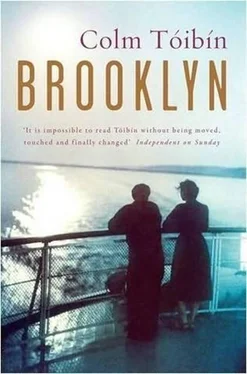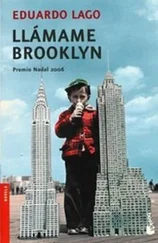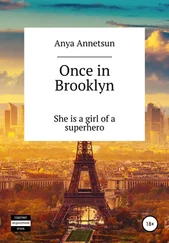When she had danced the first set with him and the music stopped he introduced himself as Tony and asked her if he could buy her a soda. She knew this meant that she would have to stay with him for the next dance, and since by then Dolores might have gone home or found someone of her own to dance with, she agreed. As they passed Diana and Patty, she saw both of them taking Tony in, looking him up and down. Patty made a sign as if to say that he was not quite up to her standard. Diana simply looked away.
The next dance was slow and Eilis was worried about moving too close to Tony, although it was difficult not to, as there were many dancers on the floor. For the first time she was aware of him, sensing that he too was trying not to move too near, and she wondered if he was being considerate or if this meant that he did not like her very much. At the end of this set, she thought, she would thank him and go to the cloakroom, get her coat and go home. If Dolores complained about her to Mrs. Kehoe, she could say that she did not feel well and had to leave early.
Tony was able to move easily to the music without making an exhibition of himself or of her. As they made their way around the floor to the sound of a moody show tune on the saxophone, Eilis knew that no one was paying any attention to them. She felt the heat from him, and when he tried to say something she smelled a sweetness from his breath. For a second she looked at him again. He was carefully shaved and his hair tightly cut. His skin looked soft. When he caught her looking at him he twisted his mouth in amusement and this made his eyes seem even larger than before. For the last tune in the set, which was by far, she thought, the most romantic, he moved his body closer to her. He did this tactfully and gradually; she could feel the pressure and strength of him against her as she, in turn, moved closer too, until they were wrapped around each other for the last minutes of the dance.
As they turned to applaud the band, he did not catch her eye but stood beside her as though it were inevitable, already decided, that they would stay together for the next dance. There was too much noise around them for her to hear what he said when he attempted to speak but it seemed to be just a friendly comment about something so she nodded and smiled in reply. He looked happy and she liked that. The music that began now was even slower than before and it had a beautiful melody. She closed her eyes and let him touch her cheek with his. They were hardly dancing at all, just swaying to the sound, as were most other couples on the floor.
She wondered who he was, this young man she was dancing with, and where he came from. He did not seem Irish to her; he was too clean-cut and friendly and open in his gaze. But she could not be sure. There was nothing at all of the tailored poise of Patty and Diana's friends. It was also hard to imagine what he did for a living. She did not know as they smooched together on the dance floor if she would ever get a chance to ask him.
At the end of the set the man playing the saxophone took up the microphone and, in an Irish accent, explained that the best part of the evening was ahead, in fact was about to start now, since they were going to play some céilí tunes as they had the previous weeks. They were going to ask those who knew the dance steps to take the floor first, and, he added to cheers and whistles, he hoped they would not all be from County Clare. When he gave the signal, he said, everyone else could join in; then it would be the same free-for-all that they had enjoyed the previous weeks.
"Are you from County Clare?" her companion asked her.
"No."
"I saw you the first week but you didn't stay until the end so you missed the free-for-all and you weren't here last week."
"How do you know?"
"I looked for you and didn't see you."
Suddenly a tune began; when she glanced at the stage she saw that the band had transformed itself. The two saxophone players had become a banjo player and an accordion player and there were two fiddle players as well as a woman playing an upright piano. There was also the same drummer. A number of dancers moved into the centre of the hall and now became the focus of attention as they managed a set of intricate movements with immense confidence and speed. Soon, they were joined by others, equally skilful, to the sound of whoops and cheers from the crowd. The music grew faster; all the instruments together were led by the accordion player; the dancers made a loud noise with their shoes against the wooden floor.
When the accordion player announced that they were going to do "The Siege of Ennis" more dancers took to the floor, and they began to change from ordered dancing towards the free-for-all the man had mentioned earlier. As Tony suggested they take the floor also, Eilis quickly agreed, even though she did not know how to do the steps. They found a group who were standing in two lines facing each other, with a man giving instructions through a microphone on what should happen next. A dancer from each end-a man and a woman-moved into the centre and swung around before returning to their original place. Then it was the turn of the next dancer until each had had a moment in the centre. The two lines of dancers then came forward to confront one another and, once that was done, one line put their arms in the air and let the other through, thus finding themselves opposite a new line of dancers. As the playing went on, the shouting and laughing and roaring instructions grew louder and more intense. Great energy was put into the whirling and turning in the centre and banging the floor with their shoes. By the time the last tunes were played and everyone seemed to understand the basic steps and movements, Eilis could see that Tony loved this and put as much effort as he could into getting it right while making sure also that he did not do more than she did. She felt that he was holding himself back for her.
As soon as the music stopped he asked her where she lived; when she told him he said that it was on his way home. There was something about him now, something so innocent and eager and shiny, that she almost laughed out loud as she said yes, that he could walk her home. She told him that she would meet him outside when she had fetched her coat. When she went to the cloakroom, she watched out for any sign of Dolores in the queue.
It was freezing outside; they moved slowly through the streets huddled against each other, hardly speaking at all. When they came close to Clinton Street, however, he stopped and turned and faced her.
"There's something you've got to know," he said. "I'm not Irish."
"You don't sound Irish," she said.
"I mean I'm not Irish at all."
"None of you?" She laughed.
"Not a single bit."
"So where are you from?"
"I'm from Brooklyn," he said, "but my mom and dad are from Italy."
"And what were you doing-"
"I know," he interrupted. "I heard about the Irish dance and I thought I'd go and look at it and I liked it."
"Do the Italians not have dances?"
"I knew you were going to ask me that."
"I'm sure they're wonderful."
"I could take you some night but you would have to be warned. They behave like Italians all night."
"Is that good or bad?"
"I don't know, but bad because if I had gone to an Italian dance I wouldn't be walking you home now."
They continued in silence until they reached the front of Mrs. Kehoe's house.
"Can I collect you next week? Maybe get something to eat first?"
Eilis realized that this invitation would mean that she could go to the dance without having to take the feelings of any of her fellow lodgers into account. Even for Mrs. Kehoe, she thought, it would serve as an excuse not to have to accompany Dolores.
Later, during the week, as she was making her way from Bartocci's to Brooklyn College, she forgot what she was looking forward to; sometimes she actually believed that she was looking forward to thinking about home, letting images of home roam freely in her mind, but it came to her now with a jolt that, no, the feeling she had was only about Friday night and being collected from the house by a man she had met and going to the dance with him in the hall, knowing that he would be walking her back to Mrs. Kehoe's afterwards. She had been keeping the thought of home out of her mind, letting it come to her only when she wrote or received letters or when she woke from a dream in which her mother or father or Rose or the rooms of the house on Friary Street or the streets of the town had appeared. She thought it was strange that the mere sensation of savouring the prospect of something could make her think for a while that it must be the prospect of home.
Читать дальше












